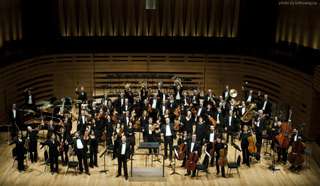|
Back
Variations in time Toronto
Koerner Hall
11/23/2014 -
Adam Scime: Rise
Henri Dutilleux: The Shadows of Time
Joji Yuasa: Revealed Time
Douglas Schmidt: Just a Stranger Here Myself
Teng Li (viola), Mara Bowman, Alexandra Bernstein, Morgan Graves-Ward (voice)
Esprit Orchestra, Alex Pauk (conductor)

(© Bo Huang)
The concert opened with the first of two world premieres, Adam Scime’s Rise, specified as being for “stereophonic orchestra”. Accordingly, some instruments were grouped on opposite sides of the stage to further the back-and-forth rhythmic oscillations which also become low-to-high sonic oscillations. It is all meant to evoke waves (of the oceanic variety) as well as the waves of history. An engaging 10-minute piece.
Next up was the Canadian premiere of Henri Dutilleux’s The Shadows of Time, commissioned by the Boston Symphony Orchestra and premiered by them in 1997 under Seiji Ozawa. The 20-minute work is in five linked sections; their translated titles are “The Hours”, “Evil Ariel”, “Memory of Shadows”, “Waves of Light”, and “Blue Dominant?” The central section features three girls (members of the Canadian Children’s Opera Company) speaking the phrases “Why us?” and “Why the star?”; this is meant to allude to Anne Frank, and the section is dedicated “to all the world’s children”. Amidst the restless variety of orchestral colour and effect (a bit reminiscent of Dutilleux’s near contemporary, Olivier Messiaen), the passing reference to the horrors of the Holocaust lacks impact, to say the least. It comes across as an effort to give the swimmingly abstract music (spiced at the start and finish by clockwork ostinato) a degree of importance it doesn’t really earn.
Another Canadian premiere was Japanese composer Joji Yuasa’s Revealed Time for viola and orchestra, with the stalwart Teng Li, the Toronto Symphony Orchestra’s principal violist, as soloist. The work was first performed by the Tokyo Metropolitan Symphony Orchestra with Rivka Golani (one of the 60-odd concertos she has premiered). It begins with a veritable riot of sound from the wood-block; what follows is moody and discursive. As conductor Alex Pauk notes, there is “a wealth of viola sonorities”; Teng Li is, as ever, a riveting performer. The ending is distinctly melancholic.
The evening concluded with the premiere of Douglas Schmidt’s Just a Stranger Here Myself. The composer’s note makes it clear that there is no musical link with the Kurt Weill song of the same title. Instead, it derives from the composer’s own sense of displacement as a Canadian expat living in Germany who feels dislocated once again when returning to his home country.
The resulting 22-minute work is in five distinctly separate movements, the first four of which feature vividly contrasting rhythmic variations. It opens with a jazzed-up march with a driving rhythm subject to spasms and sag. The second movement gives us heavy, deliberate rhythms; forward motion alternates with stasis. The third movement features a variety of chugging rhythms running speedily through sections of the orchestra. The fourth movement has lopsided rhythms, sounding like a big jazz band taking on something avant garde. There is an undercurrent of the repetitive intricate harmonics of the Glass-Reich school, followed by a big, jazzy finish.
The final movement is completely different, starting out with a plaintive, haunting legato section that could be construed as nostalgic. This leads to more Ravelian sounds, then a rippling flute, then solemn strings with brass in unison. A lengthy held tone underlain with aggressive percussion dies quietly away.
After the earlier free-form works on the program, Schmidt’s finely-crafted exploration of rhythmic structures came as a welcome relief. Mind you, I can’t really say it conveyed the composer’s sense of displacement (maybe a bit in the final movement.) This just goes to show that a composer’s intentions in music (the ultimate abstract form of art when not employing words) are not always taken up by the listener.
Esprit’s next concert (Jan 29, 2015) will feature flutist Robert Aitkin, founder and director of Toronto’s ever-vital New Music Concerts.
Michael Johnson
|